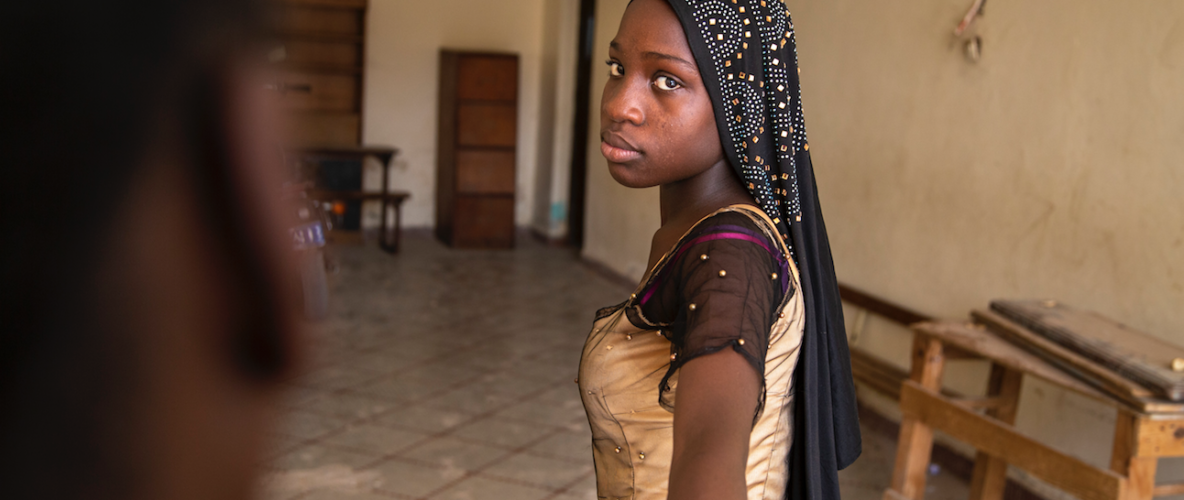
The country that did not love women
By Laura Carrillo, EU Aid Volunteer in Mauritania.
English translation by María Jaramillo, Online EU Aid Volunteer.

I arrived to Mauritania for the first time four months ago thanks to the program EUAV (EU Aid Volunteers) of the European Union to work on mental health and psychosocial support with the NGO Doctors of the World.
I am in a country with one of the world’s lowest Human Development Index (HDI). Approximately, half of the population lives under the poverty threshold and a great percentage of boys and girls suffer acute malnutrition. The Islamic Republic of Mauritania, between The Maghreb and Sub-Saharan Africa, is a country of Muslim confession where five different communities coexist: the moors, the Harratin, the Halpulaar, the Wolof and the Soninke. The hierarchical organisation of the different ethnic groups and the discriminatory dynamics in between groups make coexistence difficult, even though at first sight everything seems to flow in harmony.
Women work slowly on the dusty streets of Nouakchott, the capital of the country. Wrapped in the colours of their melafhas,they hide from indiscreet looks, guarding a thousand stories where being strong has not been an option, but the rule. Their looks are fierce, they hold her heads high and their cracked lips show determination and bravery. Life hurts but they never stop walking forward.

It is not easy to be a woman in The Islamic Republic of Mauritania. Poverty and ethnic inequalities worsen structural inequality and put women and girls in a situation of extreme vulnerability. In a social context with marked gender roles, women are frequently infantilized and deprived from their capacity to make decisions.
In many communities, their role is at home: reproduction, satisfaction of the family needs. Women are often repudiated if they do not succeed in having an offspring, as is through fecundity and servility that they fulfil the mission they have been traditionally assigned. Virginity before marriage is one of the most precious treasures and, therefore, women who do not preserve it before their marriage are stigmatised and even blamed in case they suffer sexual violence.

My job during these months has been to reinforce the capacities of the health and social care staff who provide direct care to victims of gender violence. In particular, I have given trainings about psychosocial support and psychological first aid to doctors and midwives and I have accompanied the USPEC social workers during their visits. Thanks to these experiences, I have gained an insight on the victim support structures which has let me analyse the quality of the psychosocial assistance and suggest improvements. Mauritanian professionals have always been very welcoming with me and, free of any prejudices, they have let me access their individual and group interventions so that I could be with them through the therapeutic processes they provided.

It’s January and the Mauritanian winter grants us 35 degrees of torrid sun. I am in Nouakchott’s Mother and Children Hospital and I walk to the USPEC’s social care room, part of the maternity department of the hospital. I observe in silence the social worker and the midwife’s work while they receive a teenager who survived sexual violence. After an initial interview to better understand the situation and the social context of the victim, the psychosocial worker uses the waiting time until they receive medical analysis results to promote a moment of emotional accompaniment with the teenager and her mother. These sessions of psychosocial support to victims and companions are essential to protect their mental health because they create a space of confidence and solace free of judgement which contributes to the family well-being. Occasionally, the social worker has to mediate between the parents and the victim and make them understand that a violation is never the fault of the person who is violated and that all of them must remain together to help their daughter get over the trauma experienced. After the psychosocial attention and medical tests, the victim is referred to a civil society organisation, where she will continue receiving psychological and legal assistance.
I feel lucky to be able to dive into a dimension which is so underdeveloped in Mauritania: mental health and psychosocial support to persons who have suffered traumatic episodes of a sexual nature. Throughout these months, we will continue working to integrate a mental health and psychosocial support structure in all projects DoW has in the country. This is not an easy task in a country where there are very few psychology professionals and where people with mental health problems are generally rejected by the community or brought to traditional healers to help them heal by means of magical and religious practices.

It is not easy to be a woman in The Islamic Republic of Mauritania. Nevertheless, DoW does not aim to conceive Mauritanian women and girls as passive agents and violence receptors, but wishes to progress towards their autonomy through prevention and protection to promote them being the principal actresses of their own processes.
It is possible to do small actions that may contribute to make great changes in the future. It is possible to open eyes toward respect and empathy to reduce power relations and favour all human beings being treated with the same dignity. It is possible to offer your hand to strengthen the resilience of those who suffer the most. Is possible to say YES to health and to life.
Although the short-term goal may seem a utopia, pursuing it and learning the way together is worth it. After all, this is why we are here.
